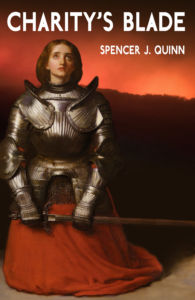Counter-Currents Radio Podcast No. 324 Interview with Spencer Quinn
Counter-Currents Radio
You can buy Spencer J. Quinn’s novel Charity’s Blade here.
145 words
To listen in a player, click here. To download the mp3, right-click here and choose “save link as” or “save target as.”
On this episode of Counter-Currents Radio, Greg Johnson is joined by Spencer J. Quinn to discuss his recent and past books, literature, and other topics. Subjects discussed include:
- 00:00:00 My Mirror Tells a Story
- 00:14:00 Charity’s Blade
- 00:26:00 Female characters
- 00:35:30 White Like You
- 00:42:30 Solzhenitsyn
- 00:55:00 Russian literature
If you want to support Counter-Currents, please send us a donation by going to our Entropy page and selecting “send paid chat.” Entropy allows you to donate any amount from $3 and up. All comments will be read and discussed in the next episode of Counter-Currents Radio, which airs every weekend on DLive.
Don’t forget to sign up for the twice-monthly email Counter-Currents Newsletter for exclusive content, offers, and news.
Counter-Currents%20Radio%20Podcast%20No.%20324%20Interview%20with%20Spencer%20Quinn
Enjoyed this article?
Be the first to leave a tip in the jar!
Related
-
Sperging the Second World War: A Response to Travis LeBlanc
-
Remembering Dominique Venner (April 16, 1935–May 21, 2013)
-
Remembering Jonathan Bowden (April 12, 1962–March 29, 2012)
-
The Woman-Punching MAGAts of Manhattan
-
Counter-Currents Radio Podcast No. 581: Fourth Meeting of the Counter-Currents Book Club — Greg Johnson’s Against Imperialism
-
Slavery and the Weak Claim Paradox
-
Reclaiming Country Music’s Imaginary Black Roots
-
Counter-Currents Radio Podcast No. 580: On Dealing with the Decline of the White World with Millennial Woes and Morgoth
2 comments
I have yet to finish listening to the whole discussion, but (as a non-practicing Librarian) has Spencer tried to get his books into the public library system ? Annual budgets are I’m sure geared towards new acquisitions, and with a friendly librarian or two could not only be profitable, but also assist in getting a White friendly message across to children, adolescents and adults via his work.
Thanks for the discussion. I’m actually a lot different from Spencer, it seems! Regarding Kurosawa, I think his basic formula, and I haven’t seen all his movies yet, is to take a classic work, usually western, and change its philosophical conclusion or basic tone. For example in Dreams, he takes Kwaidan, the medley of Japanese classic ghost stories and modernizes it. In kwaidan, the spirits are mercurial and capricious, but typically malevolent. They may leave someone alone or they may do something baneful. In Dreams the spirit world is also capricious, but most often in a benevolent way. This reflects a disagreement about the fundamental nature of the world or nature. Only in Macbeth does he seem to echo the originals conclusion and tone.
Comments are closed.
If you have Paywall access,
simply login first to see your comment auto-approved.
Note on comments privacy & moderation
Your email is never published nor shared.
Comments are moderated. If you don't see your comment, please be patient. If approved, it will appear here soon. Do not post your comment a second time.